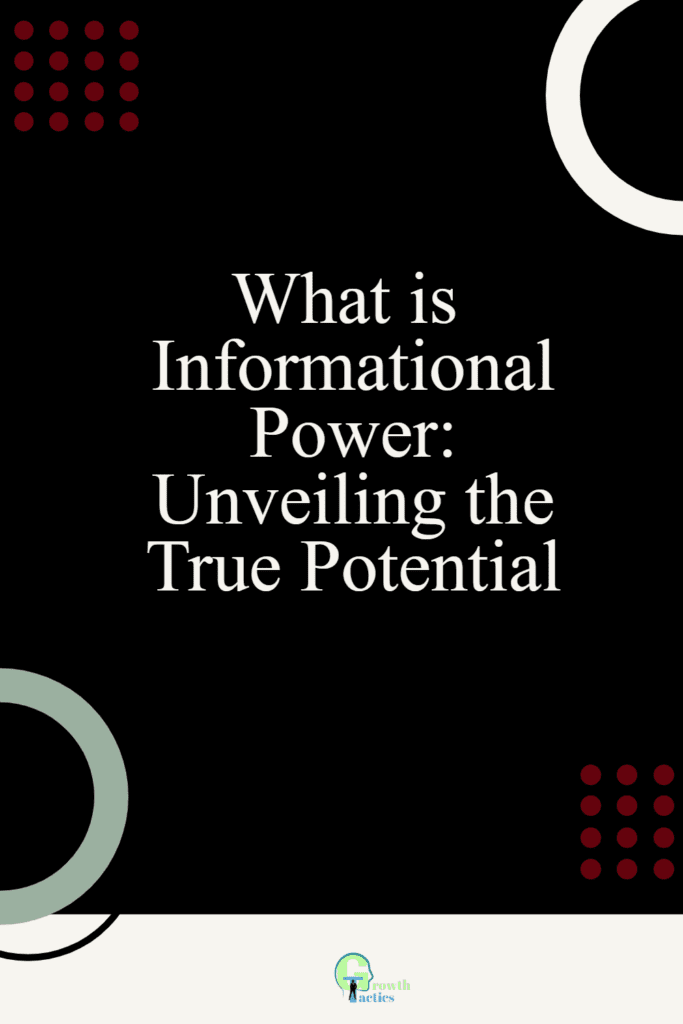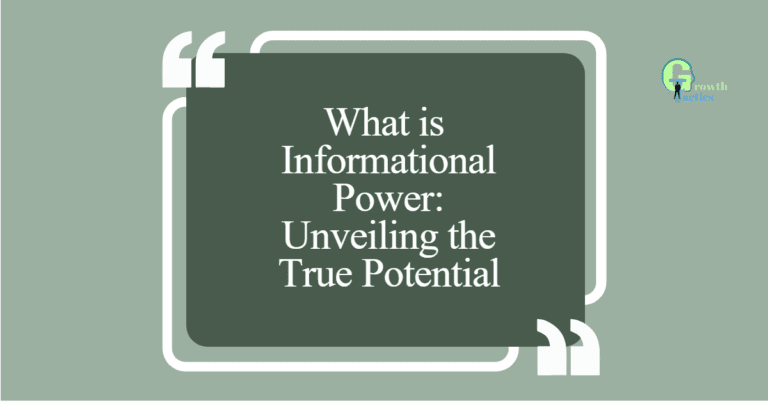Informational power is a type of social power that stems from the ability to control, manipulate, and disseminate knowledge and information. In simplest terms, it is the power individuals or groups gain by possessing valuable information others do not have.
In this article, we will explore informational power to uncover its true potential, how it impacts leadership and decision-making in the workplace, and strategies for helping individuals develop and enhance their own informational power.
Jump To Section
Understanding Informational Power

Explanation of Different Bases of Power
Power can be defined as the ability to influence the behavior of others to achieve a goal or objective. In organizations, power is often classified into different types or bases of power. Two social psychologists French and Raven (1959) identified five bases of power: coercive power, reward power, legitimate power, expert power, and referent power.
Coercive power is the ability to punish or threaten, while reward power is the ability to provide rewards or incentives.
Legitimate power is derived from one’s position or formal right to make demands.
Expert power comes from the content of one’s work or derived from one’s ability to influence others.
Finally, referent power is the power derived from others’ admiration or respect for a person.
Introduction to Informational Power as One of the Bases
Informational power is the power that comes from possessing valuable information or knowledge. Let’s face it, individuals or groups with more information have an advantage over those without it.
A person with informational power can control the flow of information in a group or organization. They can influence others by selectively sharing or withholding specific pieces of information.
Importance of Informational Power to Leadership
So why is informational power important for leadership?
A leader who possesses valuable information can leverage it to build influence and authority.
With the right information, leaders can make informed decisions that can positively impact the organization’s performance.
A leader with informational power can provide valuable insights and guidance to the team, making it easier for them to perform their duties and make informed decisions.
The Role of Informational Power in the Workplace

Examples of how Informational Power is utilized in organizations
Informational power plays a significant role in organizations, and its impact can be seen in various ways. Here are a few examples of how informational power is utilized:
-
Decision-making: Individuals with informational power often have access to crucial data and knowledge that can influence decision-making processes. They can provide valuable insights and analysis to guide organizational strategies and choices.
-
Team collaboration: Those who possess informational power can facilitate effective collaboration within teams by sharing relevant information, coordinating efforts, and guiding discussions. They can act as knowledge resources and help others make informed decisions.
-
Leadership influence: Leaders who have a strong informational power base can exert influence and inspire others through their knowledge and expertise. They can use this power to motivate and guide their team members towards achieving common goals.
Study 1: The Relationship between Informational Power and Employee Engagement
-
Description of the study design and methodology
In a study conducted to examine the relationship between informational power and employee engagement, researchers surveyed a diverse sample of employees from various industries and organizations. The participants were asked questions related to their perception of their immediate supervisors’ informational power and their level of engagement in their work.
-
Key findings and insights relating to employee engagement
The study revealed a positive correlation between higher levels of perceived informational power of supervisors and increased employee engagement. Employees who felt that their supervisors possessed valuable knowledge and shared it with them experienced higher levels of job satisfaction, commitment, and motivation. They also reported a greater sense of autonomy and trust in their supervisors.
This suggests that informational power, when effectively utilized by supervisors, has a significant impact on employee engagement and overall job performance. When employees feel informed and empowered with knowledge, they are more likely to be engaged and actively contribute to the organization’s success.
Study 2: Informational Power and Effective Communication
-
Overview of the study’s objectives
Another study aimed to investigate the relationship between informational power and effective communication within organizations. Researchers conducted surveys and interviews with employees at different hierarchical levels to understand the influence of informational power on communication effectiveness.
-
Results emphasizing the impact of informational power on communication effectiveness
The study findings revealed that individuals who possessed higher levels of informational power were more likely to communicate effectively within the organization. They had better access to accurate and relevant information, enabling them to convey messages clearly and facilitate understanding among their colleagues. Furthermore, these individuals were seen as credible sources of information, which enhanced their overall communication effectiveness.
The study emphasized that informational power enhances communication quality, fosters collaboration, and strengthens relationships within the workplace. It highlighted the importance of promoting access to information and knowledge-sharing practices to improve overall communication dynamics and organizational effectiveness.
How to Acquire Informational Power
Effective information acquisition and dissemination are key to attaining informational power in modern organizations. In this section, we will explore some of the sources and channels that individuals and organizations can use to acquire and distribute information.

Identifying Credible Sources of Information
Obtaining accurate and reliable information is the foundational step to gaining informational power. Some common sources of reliable information include industry reports, academic studies, government publications, and trade publications.
It’s important always to verify the credibility of the information source before relying on it. Individuals must cultivate an objective mindset to assess information objectively without biases and guard against inaccurate or misleading data.
Identifying and interacting with relevant subject-matter experts is another way to ensure access to quality information. By engaging with subject-matter experts, individuals can learn from firsthand accounts and experiences while also building valuable relationships.
Utilizing Various Channels to Disseminate Information
To actualize the full potential of informational power, individuals must ensure they have various channels to disseminate information effectively. Some common channels of information sharing include:
1. Intranet Platforms
Intranet platforms offer a secure and accessible digital infrastructure that supports informational sharing among organization units. They provide virtual workspaces through which employees can disseminate and exchange knowledge related to specific projects or internal operations.

2. Meetings and Presentations
Meetings and presentations offer opportunities for individuals to share information with various stakeholders efficiently. They provide an opportunity to share ideas, company updates, and discuss industry trends while fostering interpersonal connections and collaboration among team members.
3. Email Communication
Email continues to be an effective channel for sharing information; individuals these days highly rely on emails and chat rooms to exchange information with colleagues. Emails provide a convenient way to share reports, updates, and data securely while also keeping track of correspondences efficiently.
4. The Role of Newsletters in Sharing Information
Newsletters offer organizations an opportunity to share and educate employees with ease. They provide a channel through which organizations keep their employees informed about company developments, policies, and procedures.
Developing Informational Power as a Leader
As a leader, developing informational power is vital to effectively influence and guide your team. It involves acquiring knowledge and expertise, fostering strong relationships, and leveraging information to build influence and authority. In this section, we will explore strategies to enhance your informational power as a leader.
Strategies for Enhancing Knowledge and Expertise
-
Continuous Learning and Professional Development: Embrace a growth mindset and prioritize continuous learning. Engage in professional development activities such as attending conferences, workshops, and webinars, and pursuing relevant certifications to expand your knowledge base. Actively seek out opportunities to acquire new skills and stay updated with industry trends.
-
Building Subject Matter Expertise: Focus on developing deep expertise in your field. Invest time in researching and understanding emerging best practices, industry standards, and innovative approaches. This allows you to provide valuable insights and guidance to your team, positioning yourself as a knowledgeable resource.
Fostering Strong Relationships to Access Relevant Information
Information often flows through informal networks and personal connections. As a leader, it is essential to foster strong relationships within and outside the organization.
Actively engage with colleagues, industry experts, and thought leaders in your field. Attend networking events, participate in professional communities, and establish mentorship relationships. These connections grant you access to valuable information, diverse perspectives, and expert advice.
Leveraging Information to Build Influence and Authority
Informational power is not only about possessing knowledge but also effectively utilizing it to build influence and authority. Here are some strategies for leveraging information:
-
Share Information: Actively share relevant and timely information with your team. Keep them informed about industry trends, company updates, and organizational changes. By sharing your expertise, you empower your team members and enhance their trust and confidence in your leadership.
-
Make Data-Driven Decisions: Use data and analytical insights to make informed decisions. Gather relevant data to support your arguments and demonstrate the credibility of your viewpoints. This approach enhances your authority, as decisions are grounded in objective information.
-
Be a Thought Leader: Share your expertise through thought leadership activities such as speaking engagements, writing articles or blog posts, and participating in industry conferences. These activities establish you as a credible source of information, enhance your visibility, and solidify your influence.
-
Collaborate and Influence: Utilize your informational power to collaborate with colleagues and influence decision-making processes. Actively contribute to discussions by providing well-reasoned insights and guiding conversations with your knowledge. This demonstrates your value and positions you as an influential contributor within your organization.
Helping Those Around You Build Informational Power

Encouraging a Learning Culture
One of the fundamental ways to help those around you build informational power is by fostering a culture of continuous learning. Encourage your team members to pursue professional development through:
- Training Programs and Workshops: Facilitate access to workshops, courses, and training sessions that can expand their knowledge base and skills.
- Mentorship Opportunities: Pair team members with mentors who can provide guidance, share experiences, and impart valuable knowledge.
- Learning Resources: Provide access to industry journals, books, and online courses, allowing team members to stay updated with the latest trends and advancements.
Promoting Knowledge Sharing
Creating an environment where knowledge sharing is encouraged can empower individuals and enhance the collective informational power of the team. Implement the following practices:
- Regular Team Meetings: Use team meetings as platforms for sharing updates, insights, and new information that can benefit everyone.
- Collaborative Tools: Utilize collaborative tools like intranet platforms, shared drives, and project management software to facilitate easy information exchange.
- Knowledge Sharing Sessions: Conduct regular knowledge-sharing sessions where team members can present on topics relevant to their expertise or recent learnings.
Leveraging Cross-Functional Collaboration
Informational power can be significantly enhanced through cross-functional collaboration. Encourage your team to:
- Engage with Different Departments: Promote interactions with other departments to gain diverse perspectives and access new information.
- Participate in Cross-Functional Projects: Encourage involvement in projects that require input from various functions within the organization, which can lead to a broader understanding of the business.
Recognizing and Rewarding Information Sharing
Acknowledgment of efforts to share knowledge can motivate continued contribution. Implement strategies such as:
- Incentive Programs: Introduce incentive programs that reward employees for their efforts in disseminating valuable information.
- Recognition Platforms: Use internal newsletters, bulletin boards, or meetings to recognize individuals who actively share and contribute to the team’s informational power.
Building Strong Networks
Helping team members build strong networks can ensure they have access to relevant and timely information. Encourage the following:
- Networking Opportunities: Provide opportunities for attending conferences, industry events, and seminars where team members can connect with industry experts and peers.
- Internal Networking: Foster internal networking through social events and team-building activities that help build relationships within the organization.
By implementing these strategies, leaders can not only enhance their own informational power but also empower their teams, leading to a more informed, cohesive, and effective organization.
Wrapping Up Our Discussion on What is Informational Power in Leadership
In conclusion, developing informational power as a leader involves enhancing knowledge and expertise through continuous learning and subject matter expertise. By developing and utilizing informational power, you can inspire and guide your team members, successfully lead organizational initiatives, and drive overall success for your organization.


